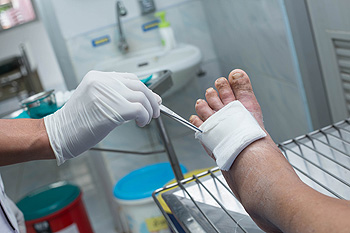 Chronic wounds are skin wounds that have difficulty in healing, or may not heal at all. Research has indicated that there are existing circumstances that may slow the healing process down. These can include smoking, eating foods that lack essential vitamins that are necessary for healing, or taking specific medications. Effective treatment methods typically begin with cleaning the affected area, followed by dressing the wound. If the wound is large, stitches or staples may be necessary to close the wound so healing can begin. If an infection is present, it is beneficial to take antibiotics which may help to reduce a fever. If you have wounds on your feet, it is strongly suggested to be under the care of a podiatrist who can properly treat any foot condition.
Chronic wounds are skin wounds that have difficulty in healing, or may not heal at all. Research has indicated that there are existing circumstances that may slow the healing process down. These can include smoking, eating foods that lack essential vitamins that are necessary for healing, or taking specific medications. Effective treatment methods typically begin with cleaning the affected area, followed by dressing the wound. If the wound is large, stitches or staples may be necessary to close the wound so healing can begin. If an infection is present, it is beneficial to take antibiotics which may help to reduce a fever. If you have wounds on your feet, it is strongly suggested to be under the care of a podiatrist who can properly treat any foot condition.
Wound care is an important part in dealing with diabetes. If you have diabetes and a foot wound or would like more information about wound care for diabetics, consult with Bruce Smit, DPM from Frankfort Foot & Ankle Clinic. Our doctor will assess your condition and provide you with quality foot and ankle treatment.
What Is Wound Care?
Wound care is the practice of taking proper care of a wound. This can range from the smallest to the largest of wounds. While everyone can benefit from proper wound care, it is much more important for diabetics. Diabetics often suffer from poor blood circulation which causes wounds to heal much slower than they would in a non-diabetic.
What Is the Importance of Wound Care?
While it may not seem apparent with small ulcers on the foot, for diabetics, any size ulcer can become infected. Diabetics often also suffer from neuropathy, or nerve loss. This means they might not even feel when they have an ulcer on their foot. If the wound becomes severely infected, amputation may be necessary. Therefore, it is of the upmost importance to properly care for any and all foot wounds.
How to Care for Wounds
The best way to care for foot wounds is to prevent them. For diabetics, this means daily inspections of the feet for any signs of abnormalities or ulcers. It is also recommended to see a podiatrist several times a year for a foot inspection. If you do have an ulcer, run the wound under water to clear dirt from the wound; then apply antibiotic ointment to the wound and cover with a bandage. Bandages should be changed daily and keeping pressure off the wound is smart. It is advised to see a podiatrist, who can keep an eye on it.
If you have any questions, please feel free to contact our office located in Frankfort, IL . We offer the newest diagnostic and treatment technologies for all your foot care needs.